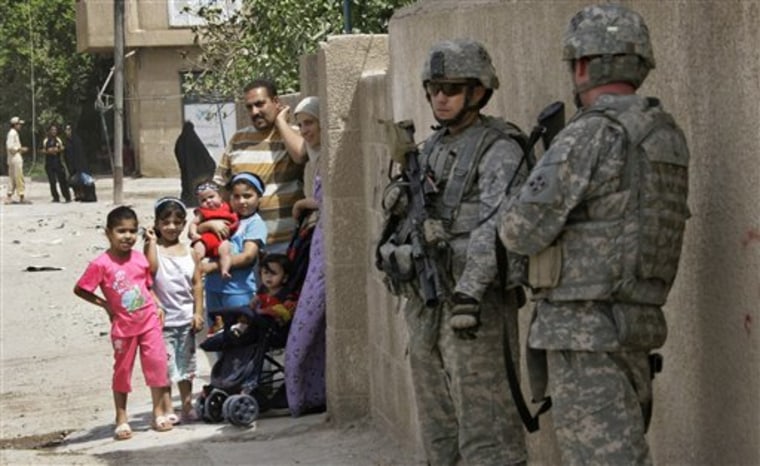A senior U.S. military official says the U.S. government has approved a draft agreement on reducing the American military presence in Iraq.
The official said the deal is not final and is subject to acceptance by Iraqi leaders. The official said that barring any Iraqi objections that would require a reopening of negotiations, the agreement meets U.S. objectives.
The official, who spoke on condition of anonymity because the deal has not yet been announced, said it includes an American demand that the United States retains exclusive legal jurisdiction over its troops in Iraq.
Also worked out by negotiators is a companion agreement known as a strategic framework agreement. The official said that Washington has approved it but it still is subject to final approval in Baghdad. That agreement covers a range of political, economic and security relationships between the United States and Iraq.
In Washington, White House spokeswoman Dana Perino said talks with the Iraqis were still ongoing and "we are trying to bring the agreement to a close. It is not done yet."
The Iraqi official, who was involved in the protracted negotiations, said the latest draft was completed last week and sent to the two governments. It also calls for U.S. troops to fully leave the country by the end of 2011.
Compromise on immunity issue
One official, who was involved in the protracted negotiations, said a compromise had been worked out on the contentious issue of immunity for American troops from prosecution under Iraqi law, but he did not give details.
Iraqis detained by American troops during military operations should be handed over to Iraqi authorities within 24 hours, the official said.
He spoke on condition of anonymity because he was not supposed to release the information.
While Iraqi negotiators signed off on the draft, another official close to Prime Minister Nouri al-Maliki said the country's political leadership objected to parts of the text, including the immunity provision.
"There are different points of view," he said. "We have given ours. The other side has given theirs."
He would not elaborate and spoke on condition of anonymity because of the sensitivity of the issue.
A third senior Iraqi official said al-Maliki himself had gone through the text personally and made annotated notes with objections to some undisclosed points. He also spoke on condition of anonymity.
Agreement a 'work in progress'
Adam Ereli, counselor for public affairs at the U.S. Embassy, said only that discussions were continuing and that the agreement remained "a work in progress."
U.S. officials recently reported progress on the timeline for troop withdrawals but said the immunity issue was a snag. They spoke on condition of anonymity because the negotiations were not finished.
The security deal is to govern the status of the more than 140,000-strong U.S. military force after the U.N. Security Council mandate for its mission expires at the end of this year.
Iraq's Cabinet must sign off on the deal and then refer it to parliament for final approval. The Shiite-led government has been pressing for some sort of timeline for the departure of U.S. troops, saying that is essential to win legislators' approval.
The decision to refer the agreement to parliament followed demands by the country's most powerful Shiite cleric, Grand Ayatollah Ali al-Sistani, that any formula to keep U.S. troops on Iraqi soil — even for a limited period — must have broad political support.
Bush softens stance on timetable
President Bush had long refused to accept any timetable for bringing U.S. troops home. Last month, however, he and al-Maliki agreed to set a "general time horizon" for ending the U.S. mission.
Bush's shift to a timeline was seen as a move to speed agreement on the security pact.
Talks were supposed to have been finished by the end of last month but differences over immunity and other issues dragged out the process.
As the talks dragged on, American officials said the Bush administration was losing patience with the Iraqis. Bush stood by al-Maliki when Washington's Sunni Arab allies were privately urging he be replaced because of the government's ties to Shiite-dominated Iran and Shiite militia attacks on Iraqi Sunnis.
Talk tense at times
Secretary of State Condoleezza Rice and al-Maliki had a long and "very difficult" phone conversation about the situation early this month during which she pressed the Iraqi leader for more flexibility, particularly on immunity, one U.S. senior official said at the time.
"The sovereignty issue is very big for the Iraqis and we understand that. But we are losing patience," the official said, speaking on condition of anonymity. "The process needs to get moving and get moving quickly."
The official could not say how long the call lasted but said it was "not brief" and described it as "tense at times."
Iraq's position in the talks hardened after a series of Iraqi military successes against Shiite and Sunni extremists in Basra, Baghdad, Mosul and other major cities and after the rise in world oil prices flooded the country with petrodollars.
As the government's confidence rose, Iraqi officials believed they were in a strong negotiating position — especially with the presumptive Democratic presidential nominee, Sen. Barack Obama, pledging to remove all combat forces within his first 16 months in office if security conditions allow.
